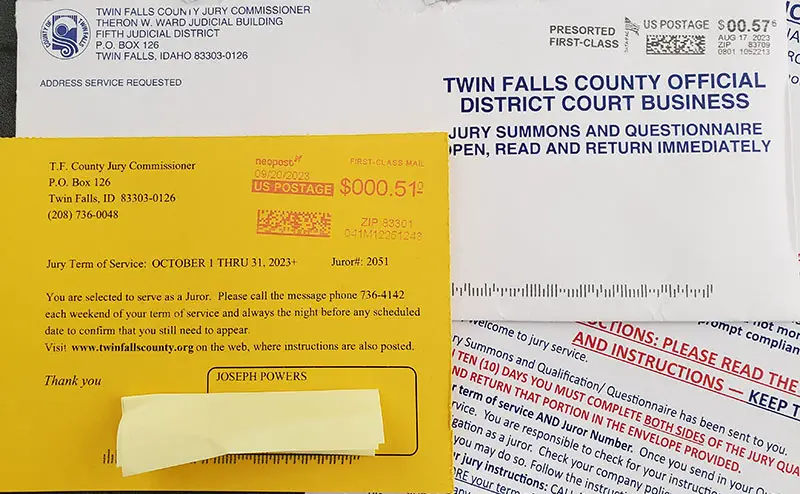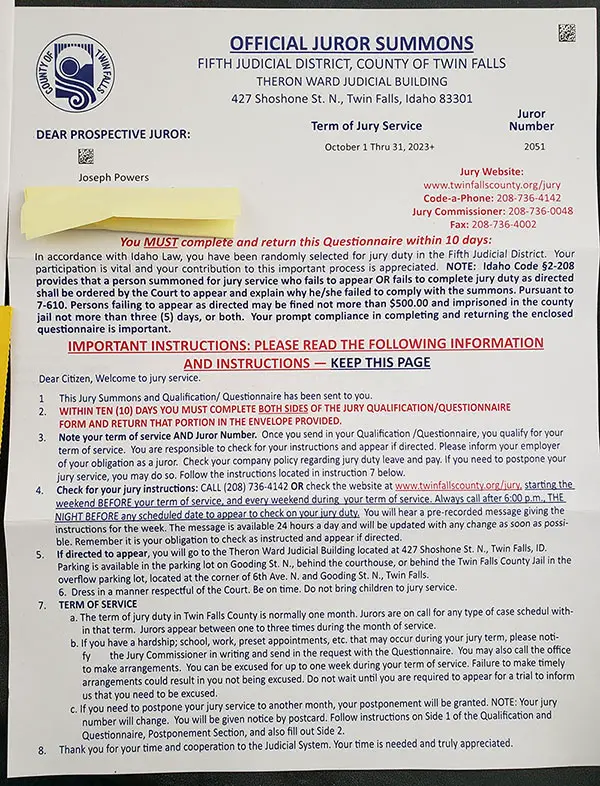

Twin Falls Prosecutor Barrages Joseph With Questions On Relevance In Evidence – That Was Fun
Jury duty, often viewed with a mix of curiosity and reluctance, turned out to be an eye-opening experience for me, especially when the prosecutor put me, Joseph, in the spotlight with a series of challenging questions.
The Initial Gathering
I arrived at the courthouse 20 minutes early, only to find that approximately 75% of the potential jurors had already gathered. The room was filled with around 70 individuals, and after seeing about 15 people excused for various reasons, I estimated my chances of being selected at 20-25%.
Dressed sharply in a suit, I couldn’t help but notice that besides the prosecutor and the public defender, my attire stood out in the crowd. However, this didn’t seem to increase my chances of being picked.
The process began with a jury introduction video, which briefly mentioned the role of the lead juror – a position that piqued my interest. When the prosecutor entered the room, I observed a change in the body language of my fellow jurors; many sat up straight, leaned in attentively, and nervously laughed at everything the prosecutor said.
The Trial At Hand
We were briefed that the case was a criminal trial involving a hit-and-run incident, resulting in injury to the victim. Beyond these details, information was sparse.
The Selection Process
The questioning phase saw the judge, prosecutor, and public defender take turns interrogating us. They asked about our ability to be impartial, any potential conflicts of interest, and whether we could handle the evidence objectively.
Several jurors had personal reasons to be excused. A woman with a heart condition that caused frequent fainting was excused, while a single mother and self-employed massage therapist expressing financial hardship was not. A lady whose husband had been killed in a hit-and-run incident was excused due to her inability to remain impartial, and another with a language barrier was also excused.
Joseph’s Moment In The Spotlight
The prosecutor’s line of questioning took a technical turn when he posed the question: “What is evidence?” I raised my hand and answered confidently, stating that evidence is considered valid if it is admissible and goes unchallenged. Before I could sit down, the prosecutor seized the opportunity to probe deeper, barraging me with questions about the relevance of various types of evidence.
Questions spanned from considering gender, political affiliation, and physical appearance, eventually leading to the topic of age. I responded by emphasizing the necessity of competency for evidence to be admissible. The prosecutor affirmed my answer but pushed further, questioning if age was a relevant factor in determining admissibility, given competency. I confidently responded “no,” and finally, he allowed me to sit.
The Final Selection
Despite my extensive engagement with the prosecutor, I was not selected as a juror. The selection process, a silent exchange of notes and whispers between the prosecutor, public defender, and judge, resulted in the selection of 12 jurors, all with numbers lower than 17. As juror number 56, I realized my hope of participating in this three-day criminal trial would not be fulfilled.
Interestingly, I couldn’t help but notice that the defendant, a short and somewhat heavier individual, seemed to have jurors selected who shared her physical characteristics. This observation led me to speculate that there might be a psychological strategy at play, an unconscious bias where people are drawn to those who resemble themselves. The defendant, witnessing my technical proficiency during the questioning, might have perceived me as a threat, aligning me more with the sharp and assertive prosecutor than with her defense.
In the end, the jury was composed of a mix of individuals, including two or three men, one of whom lightened the mood with a humorous comment that even had the judge chuckling. Notably, all of the women selected did not actively participate during the questioning phase.
As the selected jurors took their places and were sworn in, a dramatic moment unfolded. One juror hesitated, eventually revealing that his child was undergoing surgery within hours. He had not anticipated being selected and thus had not voiced this during the excusal phase. The judge’s response was stern, highlighting the challenge of the situation now that the jury had been sworn in.
Reflections On The Experience
In the end, I walked away with a deeper understanding of jury duty and the crucial role it plays in our justice system, even if I wasn’t the one in the jury box.
The journey through jury selection was a fascinating glimpse into the legal process, filled with unexpected turns and valuable insights into human behavior and the intricacies of courtroom dynamics.
Although I wasn’t chosen, the experience was enlightening. From the rigorous questioning to the strategic selection of jurors, it was a firsthand look at the complexities of the legal process.


